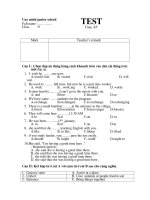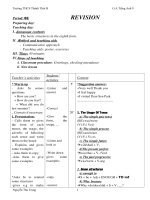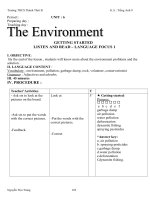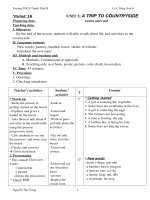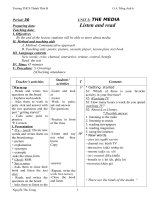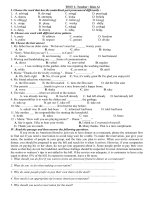Tiếng anh 9: Bài giảng_unit_9 a closer look 2
Bạn đang xem bản rút gọn của tài liệu. Xem và tải ngay bản đầy đủ của tài liệu tại đây (379.29 KB, 4 trang )
UNIT 9. ENGLISH IN THE WORLD
LESSON 3. A CLOSER LOOK 2
Môn: Tiếng Anh 9 chương trình mới
Cô giáo: Quang Thị Hoàn
Conditional sentences type 2: review
(Câu điều kiện loại 2: ôn tập)
Activity 1 a. Read this sentence from the conversation in GETTING STARTED. Do you remember when
we use conditional sentences type 2?
( Đọc câu sau đây từ đoạn đối thoại ở phần GETTING STARTED. Bạn có nhớ khi nào chúng ta dùng câu điều
kiện loại 2 không?)
Duong: Yeah, if there weren’t so many words, it would be easier for us to master it!
Look out!
In a formal context, we normally use “were” instead of “was”:
If I were you, I would think more carefully about the job. (more formal)
If I was you, I would think more carefully about the job. (more informal)
b. Write Yes or No to answer the questions about each sentence.
( Viết Yes hoặc No để trả lời câu hỏi về mỗi câu)
Gợi ý:
1. Nếu Tiến có chứng chỉ IELTS, anh ấy sẽ có việc làm.
Tiến có chứng chỉ IELTS không?
=> No
2. Nếu giáo viên tiếng Anh của chúng tôi không có ở đây, chúng tôi sẽ không biết làm gì.
Bây giờ giáo viên có ở đây không?
=> Yes
3. Nếu chúng tôi đến Anh mùa hè này, chúng tôi sẽ có cơ hội học chút tiếng Anh.
Có thể rằng họ sẽ đến Anh mùa hè năm nay không?
=> No
4. Tiếng Anh sẽ dễ thành thạo hơn nếu không có nhiều từ vựng như vậy.
Tiếng Anh có dễ để thành thạo không?
=> No
5. Nếu cô ấy dùng tiếng Anh thường xuyên hơn, tiếng Anh của cô ấy sẽ không yếu như vậy.
Cô ấy có dùng tiếng Anh thường xuyên không?
=> No
1 Truy cập trang để học Toán – Lý – Hóa – Sinh – Văn – Anh – Sử Địa – GDCD tốt nhất!
Activity 2. Rewrite the sentences using the conditional sentences type 2.
(Viết lại câu sử dụng câu điều kiện loại 2)
Example:
Peter has such a lot of English homework that he won't go to the party.
=> If Peter didn't have such a lot of E homework, he would go to the party.
Gợi ý:
1. Tôi không cảm thấy tự tin ở buổi phỏng vấn vì tiếng Anh của tôi không tốt lắm.
=> If my English were/was good, I would feel confident at interviews.
2. Minh không đọc nhiều sách tiếng Anh vì cô ấy không có thời gian.
=> If Minh had time, she would read many English books.
3. Tôi nghĩ bạn nên dành nhiều thời gian hơn trau dồi phát âm của âm.
=> If I were you, I would spend more time improving my pronunciation.
4. Mai rất giỏi về ngôn ngữ vì cô ấy có vài người bạn là người nói tiếng Anh bản xứ.
=> Mai didn't have some friends who were/are native speakers of English, she wouldn't be so good at the
language.
5. Chúng tôi không thể cho bạn công việc này vì bạn không thể nói tiếng Anh.
=> If you could speak English, we would offer you the job.
Relative Clause (Mệnh đề quan hệ)
A relative clause is introduced by a relative pronoun such as who, whom, which, that, whose, where, why and
when.
We use relative clauses to give extra information about something/someone or to identify which particular
thing/person we are talking about.
Relative pronoun
Example
which (for things and animals)
The book which I liked was the detective story.
who (for people)
The girl who is wearing a blue shirt is Mai.
whom (for people as the object of the relative clause)
That’s the boy whom we saw at school yesterday.
when (for time)
Do you remember the day when we first met, darling?
where (for places)
This is the place where they filmed Star Wars.
why (for reasona)
That’s the reason why he failed.
whose (for possession)
That’s the woman whose dog we found.
that (for people, things, animals anf time)
Where’s the letter that came yesterday?
The people that I spoke to were very helpful.
We move here the year that my uncle died.
2 Truy cập trang để học Toán – Lý – Hóa – Sinh – Văn – Anh – Sử Địa – GDCD tốt nhất!
Chú ý: Đại từ quan hệ nhất định phải đi ngay sau danh từ nó bổ nghĩa.
Example: My friend plays the guitar. He has just released a CD.
=> My friend plays the guitar who has just released a CD.
=> My friend has just released a CD plays the guitar.
Activity 3a. Read part of the conversation from GETTING STARTED. Pay attention to underlined part.
Đọc lại phần của đoạn đối thoại ở phần GETTING STARTED. Chú ý đến phần được gạch chân)
b. When do we use relative clauses? Can you think of any rules?
(Khi nào sử dụng mệnh đề quan hệ? Bạn có thể nghĩ ra bất cứ quy luật nào không?)
Gợi ý:
We use relative clauses to give extra information about something/someone or to identify which particular
thing/person we are talking about.
Activity 4. Circle the correct word. Sometimes more than one answer is possible.
(Khoanh tròn từ đúng. Thình thoảng có nhiều hơn 1 đáp án đúng)
Gợi ý:
1. That's the boy who/whom/that is bilingual in English and Vietnamese.
(Đó là chàng trai người mà nói được hai thứ tiếng Anh và Việt)
2. This is the room which/who/where we are having an English lesson this evening.
(Đây là căn phòng nơi mà chúng tôi học tiếng Anh tối nay)
3. The girl who/whose/which father is my English teacher is reasonably good at English.
(Cô gái mà bố của cô ấy là giáo viên tiếng Anh thì rất giỏi tiếng Anh)
4. Do you remember the year where/when/that you started to learn English?
(Bạn có nhớ cái năm bạn bắt đầu học tiếng Anh không?)
5. The teacher whom/which/who you met yesterday is fluent in both English and French.
( Giáo viên người mà bạn gặp hôm qua thông thạo cả tiếng Anh và Pháp)
6. That's the reason where/when/why his English a bit rusty.
( Đó là lý do tại sao tiếng Anh của cô ấy vụng về như vậy)
Activity 5. Write true sentences about yourself. Then share them with your partner. How many things do
you have in common?
(Viết những câu đúng về chính bản thân bạn. Sau đó chia sẻ với bạn của bạn. Bạn bạn có bao nhiêu điểm
chung?)
Gợi ý:
I would like to:
have a friend who can play the guitar.
3 Truy cập trang để học Toán – Lý – Hóa – Sinh – Văn – Anh – Sử Địa – GDCD tốt nhất!
go to a country where people grow a lot of flowers.
buy a book which tells me more about my city.
meet a person whose father is a politician.
do something that is strange.
Activity 6. Rewrite these sentences as one sentence using a relative clause.
(Viết lại những câu sau như câu gốc sử dụng mệnh đề quan hệ)
Gợi ý:
1. Bạn của tôi chơi gita. Anh ấy vừa mới tung ra 1 CD.
=> My friend who/that plays the guitar has just released a CD.
2. Nhiều nơi của dinh thự đã được mở ra cho cộng đồng đến tham quan. Đó là nơi nữ hoàng sống.
=> Parts of the palace where/in which the queen lives are open to the public.
3. Tiếng Anh đã mượn nhiều từ. Chúng đến từ ngôn ngữ khác.
=> English has borrowed many words which/that come from other languages.
4. Tôi chuyển đến một ngôi trường mới. Ở đây tiếng Anh được dạy bởi giáo viên bản xứ.
=> I moved to a new school where/in which English is taught by native teachers.
5. Tôi không thích tiếng Anh. Có nhiều lý do cho việc đó.
=> There are several reasons why I don't like English.
6. Cô gái mới trong lớp chúng tôi khá tốt tiếng Anh. Tên cô ấy là Mi.
=> The new girl in our class, whose name is Mi, is reasonably good at English.
4 Truy cập trang để học Toán – Lý – Hóa – Sinh – Văn – Anh – Sử Địa – GDCD tốt nhất!
